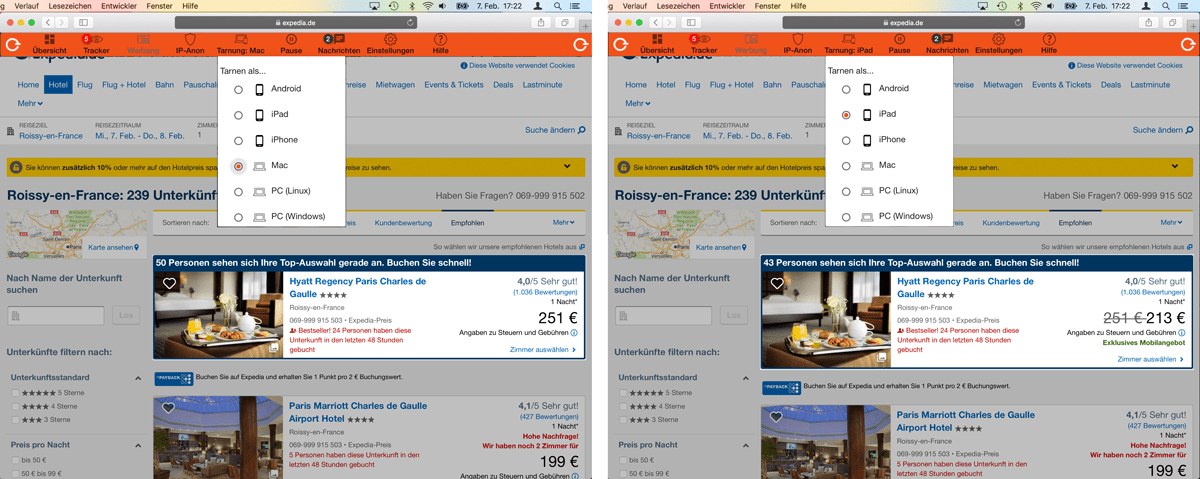Word has spread: Surfing the Internet leaves traces. How many clues are there, how expressive they are and how deep they penetrate our privacy – is surprising and rather disturbing. This article explains what you disclose during an everyday trip into the data network. What does the Internet know about me? What happens when I enter a URL? Everyone should ask themselves these questions before starting the browser. The answers can be found here!
Internet communication is based on IP addresses, whereby IP stands for Internet Protocol – the standard for data exchange. The IP address consists of a sequence of digits and is the personal Internet address assigned by the provider with which you can be reached on the net and through which you send and receive data. Computers can only communicate on the Internet using these IP addresses.
But if you want to call up a website, enter a URL (Uniform Resource Locator) in the browser – i. e. more or less the name of the page you are looking for; e. g.”google.com”. How does the browser get the IP address it needs to communicate with the desired page?
This is where the Domain Name System or DNS has its role. DNS servers all over the world work like an Internet phone book, storing domain names and their IP addresses. Your browser first sends a request to a DNS server that converts the URL into an IP address and sends it to your computer. Only then can your browser communicate with the server of the requested web address.
1. DNS of the Internet provider knows your data
And now there is already the first possibility for an unknown party to create a profile of you: The Domain Name Server receives all domains called from your network, regardless of whether they come from smartphones, tablets, computers or IoT devices. In this way, the DNS can create a profile for all domains you have accessed.
This presents several questions: Where does the DNS server stand, to whom does it belong, who receives your data? As a rule, your Internet provider operates such DNS servers and knows all called domains. Even with the encrypted transmission, for example via “https://”, the IP address of the domain must always be queried beforehand. And this is always done unencrypted in the so-called metadata – even if the actual content is encrypted.
2: The website knows your data
When you visit any web page, it also receives your IP address so that you receive the response from the server. In addition, the website operator can also recognize which subpages you call up on the page, as each page call ends up in a so-called log file. Similar to the logbook of a ship’s captain, the log file records all data retrieved from the web server. For example, which IP address called which URL at which time.
At the same time, the browser transmits a browser identification to the web server, the so-called User Agent. This is necessary so that the web server can display the content according to your device and browser – for example, in the mobile version on a small screen.
The Internet page or its operator can thus see which device with which browser accesses it at which time and from which IP address, can easily merge the entire visit history – all pages called up – and form a personality profile. For example, is the visitor of a news page more interested in political news from the right or left wing? Thus, the site operator can draw conclusions about the personality of the user solely from the pages accessed.
What’s more, the IP address can be used to determine which country, region or federal state, city or even district you live in.
In addition, the website knows your device, which in turn allows you to draw conclusions about your purchasing power. If you use a high-priced iPhone or iPad, this indicates a higher purchasing power than when using an Android device or Linux PC, for example. Many websites such as Expedia.com adjust prices to the device you use, so you might pay more for the same hotel than your neighbor.

3. Tracking systems know your data
Now the providers of tracking systems come into play, professional data collectors. Virtually all websites worldwide use tracking or web analytics systems to analyze visitor behavior. On average, websites use 20 trackers, with 70 or more trackers on one page being no exception. Tracking works like this: The operator of an Internet site inserts a tracking code of the data collector on his page. The code instructs your browser to send data to the tracker with every page view. The tracker uses a so-called cookie to recognize you at a later visit. This also works across websites, so that the tracker receives all page views from all domains you visit. In this way, the tracker can create an exact personality profile of your surfing behavior.
The reason for the tracking sounds harmless at first: By providing the operator with statistical information about the visit history, your surfing experience on its pages is to be improved.
Most websites want to earn money, and they usually do so through advertising. When the site now sells advertising, it incorporates a code from an advertising server. This so-called ad server is a type of ad management system that delivers advertising and measures, among other things, how often an ad is viewed and clicked on. Your browser receives the code from the ad server to get an image – for example, a banner for advertising. The ad server receives your IP address and information about the visited page – i. e. also information that can be used for profiling like tracking.
As we noted, only the website operator can see your IP address and the pages you have visited via the log file. A tracking code, on the other hand, transmits data about your surfing behavior to a third party such as a tracking server or ad server, which in turn has many customers – that is, websites. In this way, cross-website user profiles can be created. And here’s where it gets dangerous at the latest: putting together individual, individually harmless information makes it possible to create a personality profile over your entire behavior on the Internet.
For example, the analysis tool Google Analytics is installed on more than 80 percent of all websites worldwide! And every website visit, whether it’s about shopping, news, politics, religion or sex, is combined into a single personality profile. And if you have a Google Account, Google knows exactly who you are, where you live and what devices you own. The “Catch”, by ticking the “Accept Privacy Policy” box, you have agreed that Google stores all Internet activity related to your person. Anyone who thinks they are surfing the Internet anonymously is wrong.
4. Summary
So the answer to the question, “What does the internet know about me?”, is: much more than you like! If you want to prevent this flood of information, you must take action. Making your IP address anonymous is not enough. To effectively protect your privacy on the web, you also need to block all tracking services, ad servers and data collectors. The smart solution is the eBlocker. The device hides your IP address, stops data collectors and blocks advertising – conveniently for all Internet devices on your home network and with no complicated software installation.
Important note
Please note that this article was originally published by the former eBlocker GmbH. The contents may be outdated. Today, eBlocker is free of charge and available as Open Source. Check out the new eBlocker Open Source Project.
